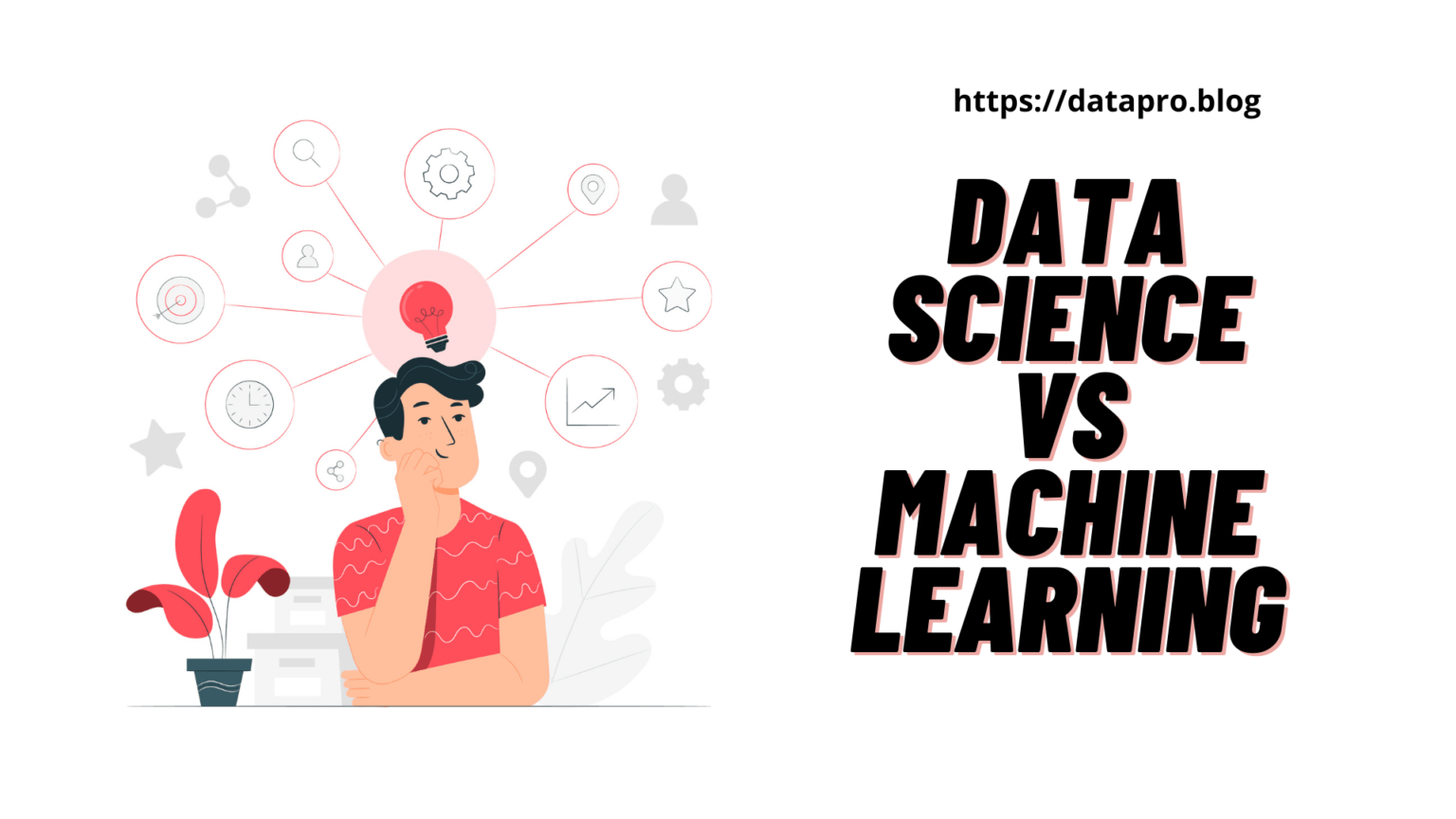Are you curious about the world of data science and machine learning? These two terms have been buzzing around in the tech industry, but what exactly do they mean? Well, data science is like a treasure hunt. It combines statistics, programming, and domain knowledge to extract valuable insights from vast amounts of data using processing techniques. On the other hand, machine learning is a subset of AI that focuses on teaching machines how to learn from data. It involves using powerful algorithms and models to enable computers, including software engineers, scientists, and mining experts, to make predictions or take actions without being explicitly programmed.
Data science, a field that combines the expertise of a computer scientist and the mining of data, involves tasks such as data preprocessing, modeling, and applying statistical methods. These demand skills are used to uncover patterns in both structured and unstructured data sets. Machine learning algorithms, a crucial tool for a computer scientist, play a key role in this process by training machines to automatically recognize patterns. From predicting customer behavior to optimizing business operations, machine learning has become an indispensable tool for various industries where computer scientists work.
So whether you’re a computer scientist interested in crunching numbers or an engineer building intelligent machines, diving into the world of data science and machine learning opens up endless possibilities for great learning experiences. Let’s embark on this exciting journey together and explore the jobs and algorithms that await us.
Table of Contents
Importance and Applications of Data Science
Data science, including machine learning models, is a crucial field that plays a significant role in helping businesses make informed decisions by analyzing large amounts of data. By leveraging the power of data, companies can gain valuable insights that drive their success. Let’s delve into the importance and applications of data science across various industries, and the roles of scientists and machine learning engineers in these jobs.
Enhancing Business Decisions
In today’s fast-paced world, businesses deal with massive volumes of data generated from numerous sources. This is where machine learning engineers and data science come into play, employing techniques from applied mathematics and statistics to extract meaningful information from raw data. By analyzing this information using machine learning models, organizations can make well-informed decisions that propel their growth. This work requires great learning.
Data science enables companies to uncover patterns, trends, and correlations within the data they collect. For instance, in marketing, it helps identify customer preferences and behavior patterns by analyzing vast amounts of consumer data. With the help of a machine learning engineer, businesses can greatly enhance their learning and tailor their strategies to target specific audiences effectively.
Applications in Healthcare
The healthcare industry greatly benefits from the application of data science. By harnessing patient records, medical research studies, and other health-related datasets, practitioners can derive critical insights for better diagnosis and treatment plans. In this industry, there is a need for a program or model that can analyze these datasets.
Data analysis in healthcare helps detect patterns using a model that may indicate potential diseases or conditions at an early stage. It aids in predicting patient outcomes based on a program using historical data. These predictions assist doctors in making accurate diagnoses and choosing appropriate treatments.
Financial Sector Advancements
The data science program has revolutionized the financial sector by enabling more accurate risk assessment models and fraud detection systems. Through advanced algorithms and machine learning techniques, financial institutions can analyze vast amounts of transactional data to identify suspicious activities promptly.
Moreover, banks employ data mining and data preprocessing techniques using historical market trends to accurately forecast stock prices or predict investment opportunities. This empowers investors with valuable insights for making informed decisions about their portfolios, highlighting the importance of skilled data scientists in the field of data science.
Marketing Insights through Data Science
In the realm of marketing, data science plays a pivotal role in understanding consumer behavior and preferences. By analyzing customer data, businesses can identify patterns and trends that help optimize marketing campaigns. This is why having a program that utilizes data science is crucial for successful marketing strategies.
Data science techniques allow marketers to program segment their target audience based on various characteristics such as demographics, purchasing behavior, or online interactions. This segmentation enables personalized marketing strategies tailored to specific customer groups, resulting in improved conversion rates and customer satisfaction.
Safeguarding Cybersecurity
With the increasing threat of cyberattacks, the data science program has become an indispensable tool for cybersecurity professionals. By analyzing vast amounts of network traffic and system logs, experts can detect anomalies and potential security breaches in real-time using the program.
Data science algorithms help build robust intrusion detection systems that continuously monitor network activities for any suspicious patterns. This proactive approach allows organizations to respond promptly to potential threats, mitigating the risk of data breaches and protecting sensitive information. By implementing a program, organizations can effectively safeguard their networks and prevent unauthorized access.
Difference between Data Science, AI, and Machine Learning
Data science, AI program, and machine learning program are three terms often used interchangeably in the field of technology. However, they have distinct differences that set them apart from one another.
Data Science
Data science is a multidisciplinary program that combines statistics, mathematics, and computer science. It involves extracting insights from complex datasets to derive meaningful information from raw data.
In data science, professionals utilize statistical methods, programming languages like Python or R, and visualization tools to uncover patterns and trends within datasets. They apply their expertise to solve real-world problems by collecting relevant data, cleaning it to ensure accuracy, analyzing it using statistical models or machine learning algorithms, and finally presenting the findings in a comprehensible manner.
AI (Artificial Intelligence)
AI refers to the development of intelligent machines capable of performing tasks that typically require human intelligence. Data scientists play a crucial role in AI development, using data mining and data preprocessing techniques to analyze and extract valuable insights from large datasets.
Unlike data science programs which focus on extracting insights from existing data sets, AI programs are concerned with creating systems that can learn from experience and adapt to new situations. These programs are designed to perceive their environment through sensors or input sources and make autonomous decisions based on the acquired knowledge.
Machine Learning
Machine learning is a subset of AI that focuses on algorithms that allow machines to learn from data. It enables computers to automatically improve their performance without being explicitly programmed for every task. The main difference between machine learning and the other two terms lies in its emphasis on algorithmic learning rather than explicit programming.
In machine learning, models are trained using large amounts of labeled or unlabeled data. Through this process of training on examples or experiences provided by the dataset itself, machines can identify patterns and make predictions or decisions. Machine learning algorithms can be categorized into supervised, unsupervised, and reinforcement learning, each serving different purposes in a program.
To summarize:
Data science involves extracting insights from data using various techniques.
AI refers to the development of intelligent machines capable of performing tasks that typically require human intelligence.
Machine learning is a subset of AI that focuses on algorithms that allow machines to learn from data.
Understanding these differences is crucial when delving into the world of technology and its applications. While data science provides the tools and methods for analyzing data, AI aims to create intelligent systems, and machine learning enables computers to learn and improve their performance autonomously. By recognizing the distinctions between these terms, we can better navigate the ever-evolving landscape of technology-driven innovation.
Comparison of Data Science and Data Analytics
Data science and data analytics are two closely related fields that involve working with data to gain insights and make informed decisions. While both disciplines share similarities, they have distinct focuses and approaches.
Emphasis on Predictive Modeling and Machine Learning Techniques
One of the primary distinctions between data science and data analytics lies in their emphasis on different aspects of analysis. Data science places a strong emphasis on predictive modeling and machine learning techniques. This involves using algorithms to analyze large datasets, identify patterns, and make predictions about future outcomes.
Data scientists leverage advanced statistical analysis methods to build models that predict customer behavior, forecast market trends, or optimize business processes. They employ tools such as regression analysis, decision trees, random forests, neural networks, and deep learning algorithms to extract valuable insights from complex datasets.
Focus on Descriptive Analysis for Understanding Past Trends
On the other hand, data analytics primarily focuses on descriptive analysis to understand past trends and patterns in data. Data analysts use various statistical techniques to explore historical information and uncover meaningful insights. They employ methods like clustering analysis, time series analysis, correlation analysis, and hypothesis testing to derive conclusions from existing datasets.
Data analysts play a crucial role in transforming raw data into actionable information by performing tasks such as cleaning messy datasets, aggregating relevant metrics, identifying outliers or anomalies in the data, and creating visualizations for better comprehension.
Importance of Data Visualization in Analytics
A significant aspect of data analytics is its reliance on effective data visualization techniques. By presenting information in visually appealing formats such as charts, graphs, or interactive dashboards, analysts can communicate complex findings more efficiently to stakeholders across various domains.
Data visualization not only enhances understanding but also helps identify trends or anomalies that might be missed when examining raw numbers alone. It allows analysts to present compelling stories backed by evidence while engaging decision-makers in a more impactful way.
Leveraging Statistical Analysis for Informed Decision-making
Both data science and data analytics heavily rely on statistical analysis to draw meaningful conclusions. However, the emphasis differs slightly between the two disciplines. Data scientists often employ advanced statistical techniques to build complex models that can predict future outcomes or classify data into different categories.
On the other hand, data analysts primarily focus on descriptive statistics to summarize and interpret historical data. They calculate measures such as mean, median, mode, standard deviation, or correlation coefficients to gain insights into patterns or relationships within the dataset.
Careers in Data Science and Machine Learning
The field of data science and machine learning is experiencing a tremendous surge in demand across various industries. Professionals skilled in these domains are highly sought after for their ability to derive valuable insights from vast amounts of data and build intelligent systems. Let’s explore some of the exciting career opportunities available in this rapidly growing field.
High Demand Across Industries
Data science and machine learning professionals are in high demand across industries such as finance, healthcare, e-commerce, marketing, and technology. The proliferation of digital technologies has led to an explosion of data, creating a need for experts who can make sense of it all. Companies rely on these professionals to extract meaningful patterns and trends from complex datasets, enabling them to make informed decisions and gain a competitive edge.
Diverse Job Roles
A career in data science and machine learning offers a wide range of job roles with varying focuses. Some popular job titles include:
Data Scientist: These skilled individuals possess expertise in statistical analysis, programming, and machine learning algorithms. They work on identifying patterns, building predictive models, and developing innovative solutions based on data-driven insights.
Machine Learning Engineer: As the name suggests, machine learning engineers specialize in designing and implementing machine learning algorithms to create intelligent systems that can learn from data without explicit programming instructions. They develop algorithms that power applications like recommendation systems or autonomous vehicles.
AI Researcher: AI researchers focus on advancing the field by conducting cutting-edge research into artificial intelligence techniques and algorithms. Their work often involves pushing the boundaries of what machines can achieve through deep learning, natural language processing, computer vision, or reinforcement learning.
Business Analyst: Business analysts bridge the gap between technical teams and business stakeholders by translating complex data insights into actionable strategies. They help organizations identify growth opportunities, optimize processes, enhance customer experiences, and drive overall business performance using data-driven decision-making.
Pursuing a Career in Data Science and Machine Learning
To embark on a successful career in data science and machine learning, it is essential to acquire the necessary skills and qualifications. While there are multiple paths to enter this field, a strong educational foundation is highly recommended. Many universities offer undergraduate and postgraduate programs specifically tailored to data science, computer science, or related disciplines.
Earning a degree program in fields such as computer science, statistics, or mathematics equips individuals with the fundamental knowledge required for these roles. Specialized courses and certifications focusing on machine learning algorithms, programming languages like Python or R, and data visualization can provide an edge in this competitive job market.
Top Universities for Data Science and Machine Learning
Stanford University is widely recognized for its comprehensive programs in both data science and machine learning. The university offers a wide range of courses, research opportunities, and cutting-edge resources to equip students with the necessary skills in these fields. Students at Stanford have the chance to learn from renowned faculty members who are experts in data science and machine learning.
MIT (Massachusetts Institute of Technology) is another top university known for its expertise in data science and machine learning. The institution offers various programs that delve into the intricacies of these disciplines. Students at MIT can explore different aspects of data analysis, statistical modeling, artificial intelligence, and deep learning. The university’s strong emphasis on research ensures that students gain hands-on experience and contribute to groundbreaking advancements in the field.
Harvard University also stands out as a leading institution for data science and machine learning education. With its interdisciplinary approach, Harvard provides students with a well-rounded understanding of these domains. The university offers specialized courses covering big data analytics, predictive modeling, and computational statistics. Harvard’s commitment to innovation fosters an environment where students can push boundaries and develop novel solutions using data-driven approaches.
Carnegie Mellon University is renowned for its exceptional programs in data science and machine learning as well. At Carnegie Mellon, students have access to state-of-the-art facilities and collaborate with world-class researchers who are at the forefront of their respective fields. The curriculum focuses on foundational concepts like algorithms, optimization techniques, and statistical methods while also delving into advanced topics such as natural language processing and computer vision.
These universities not only provide exceptional academic programs but also offer numerous opportunities for practical application through internships, projects, and industry collaborations. Students benefit from exposure to real-world challenges while working alongside professionals in the industry.
Moreover, the reputation of these institutions attracts leading companies seeking talent in data science and machine learning fields. Graduates from Stanford, MIT, Harvard, and Carnegie Mellon often find themselves in high demand by top-tier employers across various industries. The strong alumni networks of these universities further enhance career prospects for graduates.
Technical Skills Required for AI/ML Roles
Proficiency in programming languages like Python or R is essential for implementing algorithms. These languages are widely used in the field of artificial intelligence (AI) and machine learning (ML) due to their versatility and extensive libraries. Python, in particular, has become the go-to language for many data scientists and ML practitioners because of its simplicity and readability.
In addition to programming skills, strong mathematical abilities are crucial for understanding the underlying concepts of AI and ML. Linear algebra plays a significant role in modeling complex systems, while statistics enables data scientists to make meaningful interpretations from datasets. These mathematical foundations provide the necessary framework for developing algorithms that power AI applications.
Another important skill set required for AI/ML roles is natural language processing (NLP). NLP involves teaching machines how to understand and interpret human language. As AI technologies continue to advance, there is an increasing demand for professionals who can develop NLP models that enable machines to comprehend text, speech, and even emotions.
The demand for these skills is rapidly growing as organizations recognize the potential of AI/ML in various industries. From healthcare to finance, companies are investing heavily in AI-driven solutions to gain a competitive edge. As a result, individuals with expertise in programming languages like Python or R, strong mathematical skills including linear algebra and statistics, as well as proficiency in NLP techniques are highly sought after.
To summarize:
Proficiency in programming languages such as Python or R is essential.
Strong mathematical skills including linear algebra and statistics are crucial.
Natural Language Processing (NLP) expertise is increasingly valuable.
Demand for these skills is on the rise across industries.
By acquiring these technical skills, aspiring professionals can position themselves at the forefront of this exciting field of artificial intelligence and machine learning roles. With companies embracing AI technologies more than ever before, individuals equipped with these capabilities will have ample opportunities to contribute meaningfully to the development of innovative AI-driven solutions.
The Future of Data Science and Machine Learning
As technology advances further, the demand for professionals skilled in data science and machine learning continues to grow. These fields have become crucial in today’s world, where big data is abundant, and businesses are constantly seeking insights to gain a competitive edge. With emerging technologies like deep learning on the horizon, the future of data science and machine learning holds immense potential for driving innovation.
One area where data science and machine learning are making significant strides is in the realm of computer vision. By harnessing the power of neural networks, scientists can develop algorithms that enable computers to understand images and videos with human-like intelligence. This breakthrough has paved the way for applications such as facial recognition systems, autonomous vehicles, and even medical imaging analysis.
Another exciting aspect of the future lies in predictive analytics. With access to vast amounts of data from various sources, including social media platforms, businesses can leverage machine learning algorithms to make accurate predictions about customer behavior, market trends, and more. This enables companies to make informed decisions quickly and efficiently.
However, it’s important to acknowledge that there are challenges associated with this rapidly evolving field. One such challenge is dealing with the sheer volume of big data generated every day. Data scientists must develop robust techniques for collecting, cleaning, and analyzing large datasets to extract meaningful insights effectively.
Moreover, despite significant advancements in artificial intelligence (AI), machines still struggle to match human intelligence. While AI excels at processing large quantities of information quickly, it often falls short when faced with complex problems that require nuanced decision-making.
Nonetheless, businesses across industries are recognizing the value that data science and machine learning bring to their operations. From optimizing supply chains to improving customer experiences through personalized recommendations, these technologies have proven their worth time and again.
The demand for skilled professionals in this field is skyrocketing as organizations strive to unlock actionable insights from their data. Data scientists and machine learning experts are becoming indispensable assets to businesses, driving innovation and providing a competitive advantage.
Conclusion: Data Science vs Machine Learning
In conclusion, data science and machine learning are two closely related fields that play a crucial role in today’s digital world.
Data science encompasses the entire process of extracting insights from data, including its collection, cleaning, analysis, and visualization. It is a multidisciplinary field that combines statistics, programming, domain knowledge, and critical thinking to solve complex problems.
On the other hand, machine learning focuses on developing algorithms that allow computers to learn from data and make predictions or decisions without being explicitly programmed. It is a subset of artificial intelligence (AI) and relies heavily on statistical techniques.
While data science and machine learning share common goals of extracting value from data, they have distinct differences. Data science involves a broader range of skills and techniques beyond just machine learning algorithms. It incorporates various analytical methods like data mining, predictive modeling, and natural language processing.
Data analytics is often used interchangeably with data science but refers specifically to the analysis of datasets to draw insights and make informed decisions. It can be seen as a subset of data science that emphasizes statistical analysis rather than algorithm development.
Both fields offer exciting career opportunities. Data scientists are in high demand across industries due to their ability to uncover valuable insights that drive business growth. On the other hand, machine learning professionals specialize in developing intelligent systems capable of making accurate predictions or recommendations.
Several top universities around the world offer comprehensive programs in both data science and machine learning for aspiring students looking to enter these fields. These programs provide students with the necessary technical skills such as programming languages (Python or R), statistical analysis tools (e.g., TensorFlow), and domain-specific knowledge.
Looking ahead, the future of data science and machine learning seems promising. With advancements in technology like big data processing capabilities and cloud computing infrastructure, we can expect these fields to continue evolving rapidly. The demand for skilled professionals will only increase as organizations recognize the value of leveraging their data for competitive advantage.
In conclusion, whether you are interested in analyzing complex datasets or developing intelligent systems, both data science and machine learning offer exciting opportunities. By acquiring the necessary skills and staying updated with the latest trends, you can position yourself for a successful career in these rapidly growing fields.
Also read: Pytorch Installation Guide: A Comprehensive Guide with Step-by-Step Instructions 2024 – DataPro
Frequently Asked Questions
What is the difference between data science and machine learning?
Data science encompasses the entire process of extracting insights from data, including collection, analysis, and visualization. Machine learning is a subset of artificial intelligence that focuses on developing algorithms to allow computers to learn from data without being explicitly programmed.
Are data science and data analytics the same thing?
While they share similarities, data analytics is a subset of data science that specifically focuses on analyzing datasets to draw insights and make informed decisions. Data science involves a broader range of skills beyond just analytics.
What technical skills are required for AI/ML roles?
AI/ML roles often require proficiency in programming languages like Python or R, knowledge of statistical analysis tools such as TensorFlow or PyTorch, understanding of algorithms and mathematical concepts, as well as domain-specific expertise.
Which universities offer top programs in data science and machine learning?
Several top universities globally offer comprehensive programs in both data science and machine learning. Some notable ones include Stanford University, Massachusetts Institute of Technology (MIT), Carnegie Mellon University (CMU), University of California – Berkeley (UCB), and Harvard University.
What does the future hold for data science and machine learning?
The future looks promising for both fields. With advancements in technology like big data processing capabilities and cloud computing infrastructure, we can expect rapid growth in these areas. The demand for skilled professionals will continue to rise as organizations recognize the value of leveraging their data for competitive advantage.




